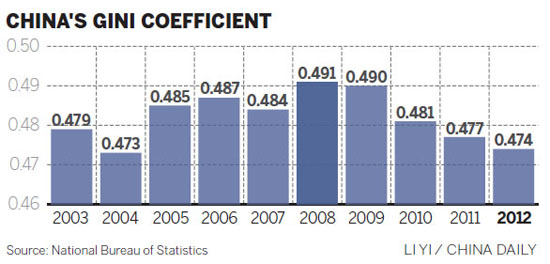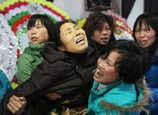
 |
But there are still doubts whether the index has accurately reflected the widening social disparity in the country.
According to data provided by the bureau, China's Gini coefficient has been retreating gradually from a peak level of 0.491 in 2008, Ma Jiantang, China's top statistics official, told a press conference in Beijing.
The Gini coefficient ranges from 0, which represents perfect equality, to 1, for absolute inequality.
The index stood at 0.473 in 2004, but after the financial crisis in 2008, it gradually dropped from its peak of 0.491 that year "as the government took measures to bring benefits for its people", Ma said.
"But China's Gini coefficient, between 0.47 and 0.49 during the past decade, was still relatively high, indicating the country must accelerate its income distribution reform to narrow the rich-poor gap," he said.
The Gini coefficient provided by the NBS presented a similar trend to that provided by the World Bank, but was much lower than a result from a private survey by Chengdu's Southwestern University of Finance and Economics published last December, which put the country's Gini coefficient at 0.61 in 2010, which prompted a huge reaction among netizens.
Commenting on the disparity, Ma said both official data and private surveys are "part of the statistics system, and serious private surveys should be an important and good supplement to government data".
He said the official figure was calculated using a new approach to review statistics tracked back to 2003.

















 'Collective children's weddings' held in kindergarten
'Collective children's weddings' held in kindergarten


![]()
